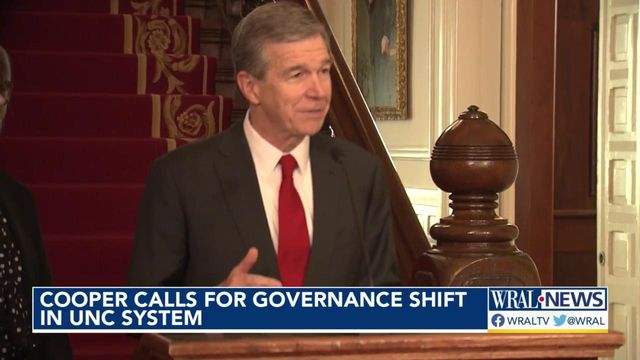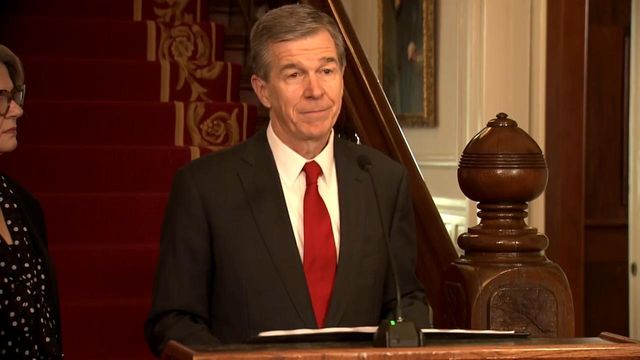Cooper calls for governance shift at UNC System
Gov. Roy Cooper called for fundamental changes Tuesday in the way the state's public university system is governed, announcing a new commission to come up with recommendations to combat what he sees as undo General Assembly influence in the system's current structure.
Cooper, a Democrat, named two previous presidents of the UNC System — Tom Ross and Margaret Spellings — to chair the new commission. He called for recommendations within eight months, which will be forwarded to Republican General Assembly leadership that Cooper criticized for politicizing the system. Any substantial changes would take legislative approval from this body, which almost certainly will continue to be controlled by Republicans after Tuesday's elections.
Approval seems unlikely. Speaker of the House Tim Moore's office quickly issued a statement saying there was "no interest in changing the structure of the UNC system, regardless of whatever report this politically-motivated commission produces." Republican state Senate leader Phil Berger's office called the announcement "Cooper's latest distraction."
“You’d have to be naïve to think the purpose of this ‘commission’ is to do anything other than recommend the Governor obtain partisan appointments to university boards," Berger said in a statement. "Gov. Cooper’s latest autocratic attempt to enlarge his power and expand executive control is disappointing, but unsurprising considering his relentless assault on the separation of powers.”
Cooper said GOP leaders were aware he would announce this effort, but told reporters that he had not decided whether they would have input into his appointees on the study commission. Those appointments, beyond Spellings and Ross, will be announced "in a couple of weeks," Cooper said. Berger's office said they didn't know about the plan until the press conference began.
Republican legislative leaders control every appointment to the existing Board of Governors, which oversees policy for the state's 16 public universities. Cooper called that process "tightly controlled" with "signs of undo political influence." Legislative Democrats have limited, if any, input on appointments, and the governor said this produces university leadership that "doesn't come close" to reflecting the diversity of North Carolina's population.
These concerns have been voiced for years, including by another former UNC system president, Erskine Bowles. Faculty at some campuses have complained of political pressure. Race is often an issue, something that came to the forefront in the fight over a Confederate statue on campus at UNC Chapel Hill and the back-and-forth over the hiring of journalist Nikole Hannah-Jones.
Board of Governors appointees have often been partisans and political donors, and the General Assembly often chooses lobbyists who come to them for policy changes and budget requests to serve on the board, raising concerns of conflicts of interest. State lawmakers also control appointments to Boards of Trustees, which oversee individual system campuses. The Republican-controlled General Assembly removed gubernatorial appointment powers to these boards after Cooper beat Republican Gov. Pat McCrory in the 2016 elections.
The executive order laying out Cooper's commission calls for at least 15 members, all appointed by the governor. It's charge is to recommend "who should appoint the members of the Board of Governors and the members of each Board of Trustees" and to come up with a plan to "ensure that the composition of the Board of Governors and each Board of Trustees reflects the regional, ethnic, racial, gender, gender, political, and economic diversity of the state."
Commission members will not be paid.
Cooper said that, if the commission recommends that the governor appoint members to either board, those changes should be delayed until he leaves office in 2025. Asked for other changes the commission might recommend, Cooper also said perhaps minority party members in the General Assembly could be given some appointment decisions.
The selections of Ross and Spellings makes Cooper's commission a bipartisan one, and both have long-running relationships with the state's political leadership, though some of those relationships have been rocky ones.
Ross, a Democrat, headed the university system from 2011 to 2015, when the Board of Governors pushed him out. Earlier this year he served as a special master in a lawsuit that ultimately changed Republican-drawn legislative and congressional districts, a process GOP leaders have complained about to the point of pressing some of their issues before the U.S. Supreme Court.
Spellings was President George W. Bush's secretary of education and became the UNC System's president in 2016. She announced her departure in the fall of 2018 with two years left on her contract. She often bumped heads with GOP appointees to the Board of Governors, but said when she resigned that relations with the board didn't factor in her decision.
Ross and Spellings joined Cooper at the governor's mansion to announce the commission Tuesdasy. Spellings said she hoped to see "greater engagement, greater inclusion" from a new governance process. Ross said what emerges from this review "can be a model for the rest of the nation." Cooper said he worries political meddling is eroding the foundation of "a priceless gem, a crown jewel ... a treasure that pays us back over and over."
"Unfortunately, a spate of controversies over the last few years has led to concerns that boards plagued by undue political influence and bureaucratic meddling hinder effective university governance," Cooper said in a written statement. "Instability and political interference can have significant impacts on campus leadership, turnover and academic experience for students, and can threaten the university’s reputation and the state’s economy and communities."
Current University System President Peter Hans, who Cooper said is doing a good job "under the circumstances," said in a statement Tuesday that disagreements over policy and governance are a fact of life and that the system welcomes the system welcomes "public interest and accountability."
"As my predecessor President Bill Friday observed, 'The university has always been the object of criticism, and this is a healthy circumstance," Hans said in a statement. "'Our state and its old University have thrived and grown great because its people are free to have their say.'"












